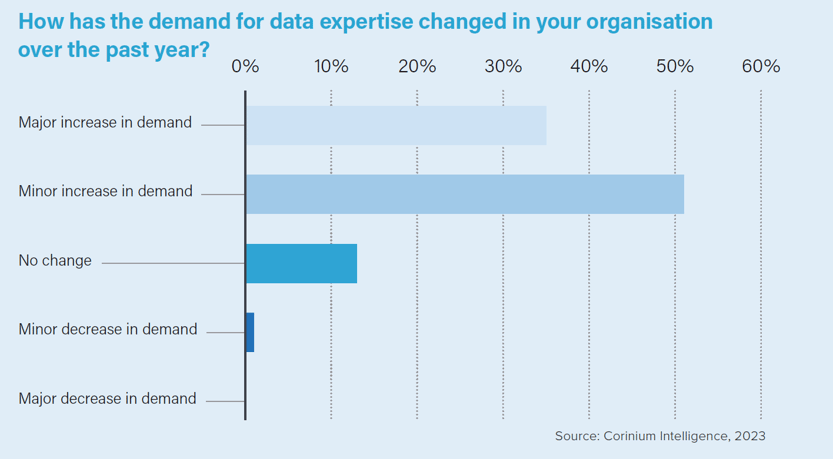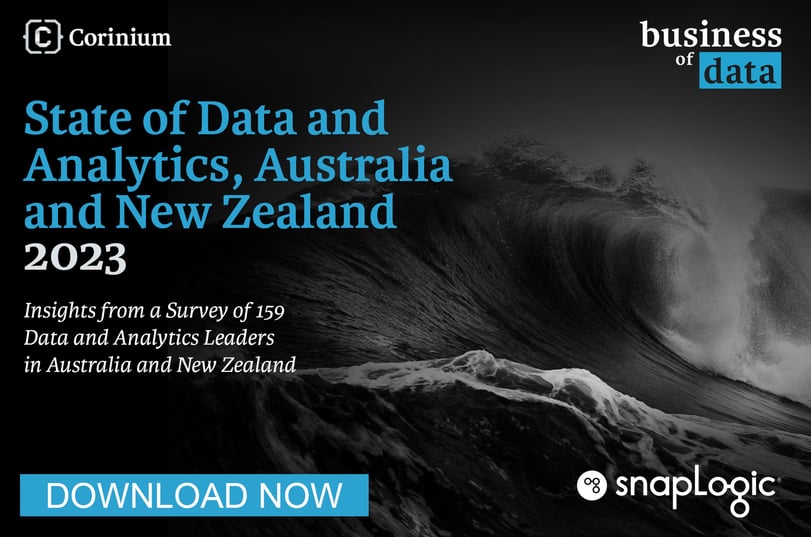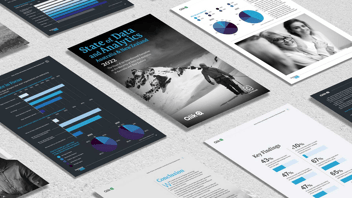Demand for Data Expertise soars in Australia, New Zealand

In this excerpt from the 2023 State of Data and Analytics Australia and New Zealand report, we look at the demand for data expertise in our region, and discuss the evolving role of the CDAO
Data and analytics is a driving force in the ongoing digital transformation taking place in organisations across Australia and New Zealand. Adoption and innovation in the data and analytics field represents a great opportunity for this region, and studying this discourse remains an exciting project.
In 2023, data and analytics are more than just buzzwords. This field can drive business, command interest and warrants investment. Companies that overlook the potential of data and analytics risk falling behind in the modern business landscape, where insights and business decision-making are now inextricably linked.
Organisations will vary in their approaches and uptake of data and analytics practices and technologies, there will be disparities in maturity and capability along this journey.
In its own way, our third annual State of Data and Analytics Australia and New Zealand report tracks and reports on that progress. We take pleasure in watching this exciting space evolve in our corner of the world.
In this short excerpt from the full report, we’ll see that the demand for data and analytics expertise and insights is only growing, and that there is considerable confidence in programs and capability built into the market.
Each year, we begin our survey by asking respondents who they report to. While all respondents targeted are senior, the function of data leaders is often nested in other business disciplines, or tiered in such a way that there are multiple data leadership positions.
Of the 159 data leaders surveyed, about 6% report to the CEO. Just under 19% of all participants fall under a more senior data and analytics position, either a CDAO, CDO or CAO. This year, 35% of respondents report to the CIO, and 18% report to the CTO, while 21% report to the COO.
These findings suggest that data and analytics leaders participate in several business units, from data teams, operations, technology and the C-suite, and goes some way to indicate where an organisation believes its data expertise to be most valuable.
Like our first year of reporting, we see more surveyed data leaders falling under the management of the CIO than any other single title. Combined with those who work for a CTO, we observe that 53% of surveyed data leaders report to leadership roles typically associated with technology, suggesting that this is where data positions remain oriented for many organisations in our region.
An Evolving Role
Data leaders often hold the view that data and analytics leadership should report to the CEO level if the organisation truly strives to be data-driven.
While we are yet to observe a clear trend of this occurring in our research, it should be said that data roles have advanced in a relatively short period of time.
RMIT CDAO Nonna Milmeister, who started her career as a project manager implementing data quality projects in the 1990s, says having well-defined functions for data leaders is a relatively modern phenomenon.
“Organisations have moved from just managing data as a risk – and making the CDO responsible for data risk management and governance – more into how data delivers value to the organisation,” Milmeister says.
“That includes not just data, but advanced analytics and AI. Things have moved quite substantially.
“The chief data officer role has changed significantly, and the role is more and more evolved and often advertised as a chief data and analytics officer, a chief data and AI officer or a chief data and digital officer.
“While we still talk about data governance and quality, we are much more focused on how we achieve better data quality by improving business processes and then using good-quality data to achieve business objectives and implement University Strategy.”
Nonna is now reporting to the COO, and her peers are CFO, CIO, Chief People Officer and other executives.
Jeremiah Stone, Global CTO for cloud data integration platform-as-a-service provider SnapLogic, adds that as business priorities have looked toward innovation, data leader roles have evolved.
“Recently, the role of the CDO has taken on more strategic importance as companies look to make use of their business data for AI-enabled workflows and applications,” he says.
Demand for Data Expertise
The demand for data and analytics expertise is considerable, and over the past year it has increased for many organisations, majorly so in about a third of cases based on our polling.
Our survey results reveal that 86% of respondents have experienced an increase in demand for data and analytics expertise. Some 35% of respondents indicate this increase as being major, while 51% say the demand increase has been minor.
Just 13% of respondents say there has been no change in demand, while just over 1% say there has been a minor decrease in demand.
These responses suggest a clear message about the demand for data and analytics expertise in the year to July 2023.

In our first ANZ State of Data and Analytics report in 2021, a year in which COVID-19 was still strongly being felt, 60% of survey respondents indicated that demand for data and analytics expertise had increased. In 2022, 43% of respondents said demand had gone up.
Working in higher education, RMIT’s Nonna Milmeister has observed this strong demand for data expertise, and celebrates data leaders’ maturity for demonstrating the potential that business leaders are looking to capitalise on.
“Boards have started to really understand that without data they can’t effectively govern their companies. Data is at the core of everything they do,” she says.
“The ability to manage data, and have quality for predictive and prescriptive decision making is extremely important. The demand is huge.
“Technology now really provides the foundation for managing data in large volumes and different formats, and the more success we have in showing people what is possible, the more business leadership will demand it.”
Delivering Returns
While it is encouraging to see our polling suggest a strong demand for data expertise this year, digital transformation projects must rise to that demand and deliver value to their organisations.
Brian Ferris, Chief Data, Analytics and Technology Officer for customer loyalty and analytics consulting firm Loyalty New Zealand, says this means that following periods of high demand, organisations will expect returns.
“COVID-19 clearly created a push for data and analytics’ role in digital transformation, and companies that were online clearly were doing a lot better than those relying on brick and mortar,” Ferris says.
“Data, I think, was seen as the mana from heaven to drive that. It has seen huge demand in terms of insights, resources and on talent and quite a lot of investment.
“However, what I’ve seen in the past six months or so is some of the chickens coming home to roost in terms of CFOs asking to see the ROI that was promised. Two or three years into a big investment, working with big teams, company leadership will be looking to see results.
“The organisations that are a small majority and have done well in terms of building foundations, culture and strategies, they are starting to see good results. They’ll get continued investment and a lot of benefit of the AI technologies that are coming.
“For those that haven’t built those foundational elements, the investments they had will start to crunch with them, and talent will re-enter the market as some teams get reduced.”
Read the entire State of Data and Analytics Australia and New Zealand, 2023 report in full by clicking this link.




/BoIS_GA.jpg?width=352&name=BoIS_GA.jpg)